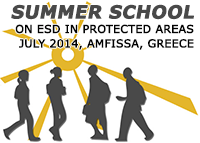|
|||||
| |
|
Home Partners Designated areas & BRs The course Trainers Presentations Students' Essays - TOOLKIT - Recommendations for Nagoya Participants Agenda Report Students' Info Practical Info The host venue Funds Contact us |
|
The Course The course will be based on the main ESD principles and methods including critical thinking, participatory processes, interdisciplinary and systemic approaches, as well as skills enhancing employability. There will be provision during the design/development phase of the course so as that all sessions to be learner centered, task-driven and group and/or peer work. The content is based on the aforementioned book and will be enriched with real scenarios: e.g. learners may compare management plans of Designated Areas and draw conclusions; interview staff of DAs on the educational activities applied, etc. Method of work Evaluation: LEARNER’s PROFILE The course will address to post-graduates of all relevant disciplines with genuine interest in gaining new competences enabling them to respond to the ever increasing demands on teaching and working on SD. The background of the candidates can be: Natural Sciences, Environmental Sciences, Social Studies and Education. Participants should prove to have a good level of English as well as computer skills. |
Under the auspicies of the hellenic National Comission for UNESCO |
||





